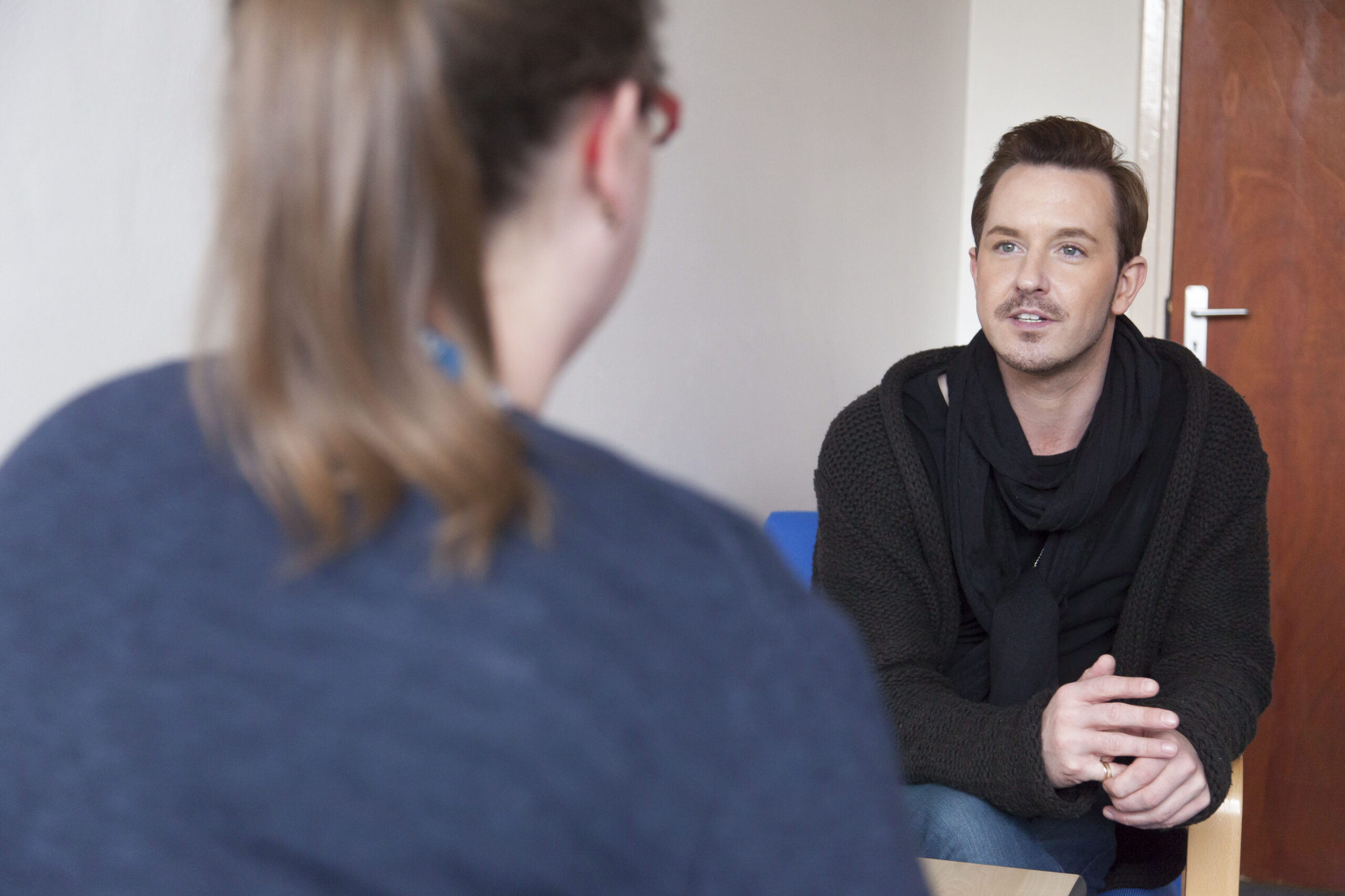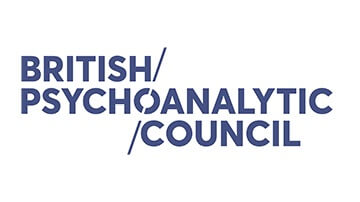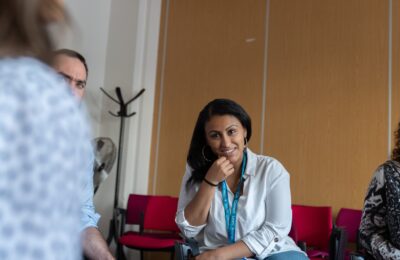
Foundations of psychodynamic psychotherapy (D58)
Join us on part one of our clinical training to become a British Psychoanalytic Council registered therapist
Please note: We will not be accepting new applications for this course. Instead, we invite you to discover our Psychodynamic psychotherapy (M58) course, which combines our foundation and qualifying trainings into a smoother, more cohesive learning experience. Read more about this consolidation (FAQs).
This course forms part one of the training that will enable you to become a registered therapist with the British Psychoanalytic Council (BPC). You will be introduced to a psychoanalytic way of thinking about your clinical work which will form a solid foundation from which to pursue further training in psychotherapy.
This course is also delivered in London via evening classes and in Leeds.
If you are considering transferring to this course from another institution, please make this clear on your personal statement.
Please note: you may see the D58 course also referred to as PCMATP001 in communications from our application system.
About this course
Centred on clinical work, you will undertake a supervised clinical placement, where you will see a patient for psychotherapy once a week for a period of a whole calendar year. You will also learn through supervision groups, clinical seminars and online lectures on fundamental psychoanalytic concepts and texts.
Supervision groups
You will meet in a small, supervised group on a weekly basis throughout the first two years. In this group you will present detailed sessions of your work with your psychotherapy patient. The focus is on developing the basic clinical skills of psychotherapy – maintaining the setting, understanding transference and countertransference, formulating interpretations, risk assessment and management, and appropriate record keeping.
Please note, you will be seeing your patient on placement in an NHS or equivalent setting. It is extremely unlikely that you will be able to see a patient at the Tavistock Centre and therefore, you will need to secure your own placement.
Clinical seminars
You will participate in a group with a clinical seminar leader where you will present your psychotherapy patient. The aim of this group is to reinforce the clinical skills learned in the supervision group and to link the clinical material with theoretical ideas and to introduce the idea of clinical formulation.
Theory lectures
The aim of weekly seminars is to introduce you to fundamental psychoanalytic concepts and texts, looking at these both historically and with reference to different theoretical traditions. These will take place at the Tavistock Centre in London.
Personal psychotherapy
You are required to be in personal psychotherapy at least once a week with a psychoanalytic psychotherapist or psychoanalyst registered by the BPC (please note: a psychodynamic psychotherapist or therapist on another register is not suitable). You need to have been in this type of therapy continuously for at least six months before the course starts and ideally at the time of your application. You will need to continue your therapy at least until all clinical work is completed.
If you successfully complete the first two years of this course (part one of the qualifying course in psychodynamic psychotherapy) you will be eligible to apply for part two of the qualifying course, Intercultural psychodynamic psychotherapy (D59I).
Dissertation
In the third year, four dissertation workshops are held to help you develop a dissertation proposal which is then submitted for approval. You will be required to work independently with a supervisor to write a dissertation over the spring term, usually based on your clinical work in the preceding years. This must then be submitted at the beginning of the summer term.
This is a three-year master’s level course. Students may exit after two years with a postgraduate diploma (PgDip).
Who is this course for?
This course is for mental health professionals who work across a number of sectors including the NHS. You might be a psychiatrist, psychologist, social worker, nurse or be in another mental health role in the NHS or voluntary sector.
Even if you do not have a clinical background in mental health you may still be considered if you have completed some psychoanalytically informed introductory training and a psychiatric placement prior to applying.
Course details
In order to undertake this course, we ask that you:
- have a good honours degree
- have a professional qualification in mental health or at least six months direct experience (paid or voluntary) of working within mental health
- are established in therapy with a BPC-registered psychoanalytic psychotherapist or psychoanalyst (not a psychodynamic psychotherapist) prior to starting the course, or ideally by the time you apply
Please note that these three points are essential prerequisites for being considered for the course. With regard to the personal therapy, you cannot start your clinical work with a patient until you are settled in your personal therapy for at least six months.
If you do not have a professional clinical qualification, we ask that you also have at least six months of experience of working, volunteering or shadowing in a psychiatric setting.
Home
£6,980 per year for the first and second year. £2000 for the third year. (2023/24)
International
£13,960 per year for the first and second year. £4000 for the third year. (2023/24)
For more information about financing your studies and your fee status, please see our fees and funding area.
Please note that course fees are subject to an annual uplift of 3% or the Consumer Price Inflation as at 1 September, whichever is the greater. At its discretion, the Trust may determine a figure between these two rates.
We are happy to offer a range of ways to pay your fees, as well as some funding for specific courses.
Assessment
Assessment is through a mixture of essays and written academic submissions on psychoanalytic theory as well as your clinical work with your patient.
Clinical work is assessed by your supervisors and clinical seminar leaders who will provide feedback on whether you are able to pass the clinical element of the course.
All assessments are undertaken by course staff, verified by the course lead as well as other staff and then ratified by the assessment board of the University of Essex.
Attendance
All day Tuesday from 9am to 5.30pm.
Graduates from this course pursue further trainings to become qualified psychotherapists and to work in charities, NHS settings or in private practice.
This is a foundation course and the first milestone into a fulfilling career in psychotherapy.
Why study with us?
All staff teaching on this course are experienced, practising psychoanalytic psychotherapists or psychoanalysts. This course will help you gain a deeper understanding of your clinical work and dynamics in clinical settings by approaching these from a psychoanalytic point of view.
You will be able to use this at work and apply it in a range of settings beyond psychotherapy. The course provides the first part of a unique British Psychoanalytic Council (BPC) accredited training in psychodynamic psychotherapy.
Testimonials
Course facilitators
Validations and accreditations
This course is validated by the University of Essex.

This course is accredited by the British Psychoanalytic Council.
Register your interest
Applications are now closed. Register your interest and be the first to hear when this course reopens.
Recommended courses
Explore courses to study beforehand
-
 Professional certificate
Professional certificate 
Psychodynamic Reflective Practice in Mental Health (D65)
Explore courses to study next
-
 Clinical qualification
Clinical qualification 
Inter-cultural psychodynamic psychotherapy (D59I)

